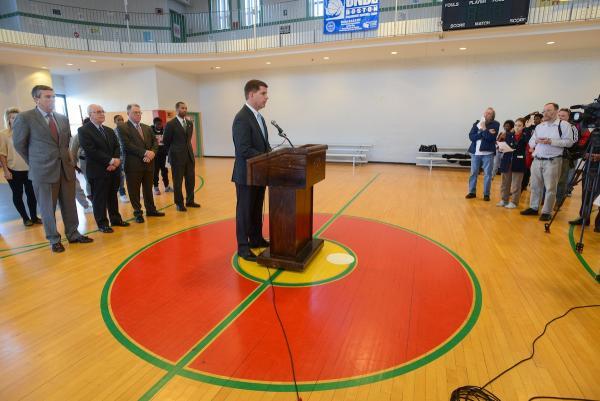December 31, 2014

Mayor Walsh spoke during a press conference at the Roslindale BCYF Community Center on Dec. 26 to announce a proposed extension of the school day. Mayor's Office photo by Jeremiah Robinson
Schoolchildren in 20 select Boston Public Schools will get an additional 40 minutes of instructional time starting next fall if a deal hammered out between the Walsh administration and union leaders is ratified by teachers and the Boston School Committee later this month. The extended school day will eventually impact 60 elementary and middle schools across the BPS system over the next three years. It’s an advance that Mayor Martin Walsh hailed as “landmark movement” and “a true turning point in our mission to provide world-class, 21st century education to every young person.”
The proposal was announced in a press conference held last Friday afternoon (Dec. 26) at the BCYF Roslindale Community Center. The mayor was joined at the event by Richard Stutman, the president of the Boston Teachers Union, BPS Interim Superintendent John McDonough and Michael O’Neill, the president of the Boston School Committee.
The expanded instruction will eventually impact about 23,000 students and is equivalent to adding one month of instruction for elementary students. Teachers will get an annual stipend of $4,464 for the extra classroom time, which according to BPS is about 20 percent lower than the typical hourly rate. It will cost the city an estimated $12.5 million per year once fully rolled out to all 60 schools.
Walsh said that in addition to extending the school day, the plan “nearly doubles the amount of time allotted to teachers for planning and professional development.”
“I’ve always said that positive change can happen in our schools when we work closely with our teachers and empower them to lead the change. Teachers are the ones who make the progress possible,” he said.
O’Neill, who expressed confidence that the proposal would pass muster with the school board and teachers, said that the first 20 schools to get the additional 40 minutes per day will likely be drawn from the pool of Level 3 schools that are considered priority.
“We are very focused on the level 3 schools,” O’Neill told the Reporter. “We want to stop any more from dropping to 4 and we want to bring our 3s up to 2. Extended time is one of the key things we’ve learned.”
Currently, students in traditional BPS elementary schools are in class for six hours a day. Middle school students are typically in class for six hours and ten minutes. The additional 40 minutes will close a gap with charter schools, which average about 8 hours of class time per day.
“People talk about charter schools and charter schools were designed to be a laboratory where you see some best practices. It doesn’t then mean you make charter schools the end all and be-all, it means you learn from what they did,” said O’Neill.
“Charter schools affect about 5,000 students in Boston; we have 57,000 students in our district,” noted O’Neill.
McDonough, who was primarily responsible for negotiating the extra time and pay package for teachers, said that the 40 minute increase was a” reasonable balance of what was achievable.” He called the 17 percent increase in work time for teachers “an incredible increase.”
The Boston School Committee will discuss the proposal at its Jan. 14 meeting and would likely vote on the matter on Jan. 28. The Boston Teachers Union, led by Stutman, will meet to discuss the plan on Jan 14.
At Friday’s press conference, Stutman expressed confidence that the plan would pass with the strong support of his members.
“The school day extension will help our students by offering well-planned, school-based instruction that promotes teaching and learning while allowing for increased participation in a variety of under-served subject areas, such as art, music, drama and foreign language,” said Stutman. “We are pleased to have been part of a truly collaborative effort that brought this about.”
In announcing the news, Mayor Walsh made good on a campaign pledge to add more time to the school day by working with the BTU on a compromise.
“Experts agree that adding more learning time makes a real impact on a school’s success,” said Walsh. “We have examples of that success at Boston Public turn-around and magnet schools. [At] six hours, the vast majority of Boston Public school kids still receive less classroom time than the national average. We have to put our students in the best possible place to succeed. This is not a situation we can allow to stand. We’ve talked about this changing for many, many years. Today I’m proud to say that we can move forward from talking to action.”
Topics:


